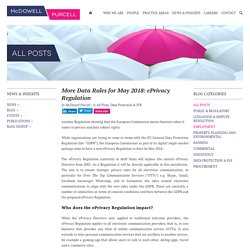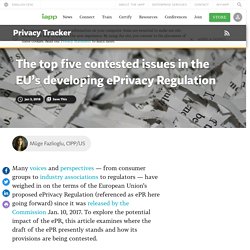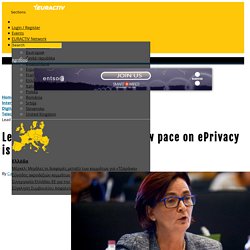

GDPR + e-Privacy = :-( At some point in your life, you’ve probably had the experience of meeting someone who you feel you ought to like but, no matter how hard you try, you just can’t seem to gel with them - awkward silences creep into conversations and you find that, while you may share similar values, the ways you each go about approaching things are just different.

Ultimately, despite both your best efforts, there’s just no chemistry. That’s what I imagine Europe’s GDPR and e-Privacy Directive would be like as playmates, if only they were people. They share common values - the protection of individuals’ fundamental rights to privacy and to data protection - and yet, try as they might, they just don’t play together all that nicely. Unambiguous consent for cookies? Nowhere is this more apparent than when it comes to the issue of cookie consent. So far, so good, but the treatment of cookies under these two laws raises a real conundrum. Time passes by, and along comes the GDPR. ePrivacy draft regulation gets stricter after European approval.
More Data Rules for May 2018: ePrivacy Regulation - McDowell Purcell. Another Regulation showing that the European Commission means business when it comes to privacy and data subject rights.

The EU ePrivacy Regulation (ePR) The top five contested issues in the EU’s developing ePrivacy Regulation. Many voices and perspectives — from consumer groups to industry associations to regulators — have weighed in on the terms of the European Union’s proposed ePrivacy Regulation (referenced as ePR here going forward) since it was released by the Commission Jan. 10, 2017.

To explore the potential impact of the ePR, this article examines where the draft of the ePR presently stands and how its provisions are being contested. The five most hotly-contested issues are: Regulatory scopeData subject consentCookies and tracking wallsWiFi trackingPrivacy by design/default Scope According to the Commission, one of the key features of the proposed regulation is that its scope extends to cover commonly used, “over-the-top” internet-based electronic communications services, such as WhatsApp, Facebook Messenger, Viber, and Skype (commonly referred to as "OTT providers"), to ensure they provide the same level of protection as traditional telecommunications operators.
CONSLEG%3A2002L0058%3A20091219%3AEN%3ATXT. 17 10 05 edps recommendations on ep amendments en. Lead MEP: member states’ slow pace on ePrivacy is unacceptable. Different political groups need to accept the European Parliament’s agreement on the draft ePrivacy regulation, even though conservative and centre-right MEPs opposed the bill, Birgit Sippel said in an interview with EURACTIV.com.

Sippel, a German Socialist MEP, became the Parliament rapporteur of the controversial privacy file in October 2017. The previous lead MEP Marju Lauristin left the Parliament last month after winning a local election in Estonia. Sippel described some of the dramatic twists in the ePrivacy negotiations and called out German businesses for their aggressive lobbying. This interview has been edited for length.
You recently took over as rapporteur on the ePrivacy file. Regarding the content, I think there will be no changes. So far member states been discussing ePrivacy very slowly. After a dramatic vote in Parliament last month, a small majority of MEPs approved your mandate to negotiate the ePrivacy bill with member states and the Commission. Proposal for a Regulation on Privacy and Electronic Communications. GDPR and ePrivacy Regulation explainer & analysis. Overview of how the GDPR impacts websites and adtech (IAPP podcast)
In this podcast, the International Association of Privacy Professionals interviews PageFair’s Dr Johnny Ryan about the challenges and opportunities of new European privacy rules for website operators and brands.

Update: 3 January 2018: This podcast was the International Association of Privacy Professionals’ most listened to podcast of 2017. The conversation begins at 4m 14s, and covers the following issues. Risks for website operatorsHow “consent” is an opportunity for publishers to take the upper hand in online mediaBrands’ exposure to legal risk, and the agency / brand / insurer conundrumPersonal data leakage in RTB / programmatic adtechHow the adtech industry should adapt As we told Wired some months ago, it’s not just that websites might expose yourself to litigation, it’s that you might expose your advertisers to litigation too.
But this can be fixed. Click here to view PageFair’s repository of explainers, analysis, and official documents about the new privacy rules. Website GDPR audit Website GDPR audit, Disclaimer: This information is provided for your convenience and does not constitute legal advice.

Your website may be subject to GDPR. We have compiled a few pointers to help you, regardless of the technology you use. Introduction. Oh heck, do I have a lot of 3rd parties on my website? Can websites use “tracking walls” to force consent under GDPR? This note examines whether websites can use “tracking walls” under the GDPR, and challenges the recent guidance on this issue from IAB Europe.
This week, IAB Europe published a paper that advises website owners that tracking walls (i.e., modal dialogs that require people to give consent to be tracked in order to access a website) will be permissible under the GDPR. Our view is different.